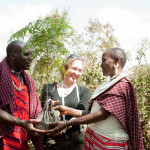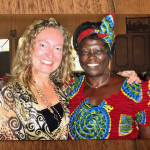The idea of Terrawatu was conceived over 20 years ago. In 1999, Tanya Pergola completed a PhD in sociology in the United States and headed to Tanzania to climb Mt. Kilimanjaro and go on her first African wildlife safari. She was not a typical tourist. Tanya had studied anthropology as a university student and has had a life-long passion for exploring and understanding other cultures, indigenous consciousness, and living in harmony with nature. She had also ‘taken the baton’ from her late father, trained in pharmacy, to run the next leg of the race towards integrating traditional healing wisdom with cutting-edge science.
While touring through the national parks and surrounding communities in Tanzania, looking out through the lenses of an environmental sociologist and activist, Tanya felt something stirring inside her. She was in a place where she could both give and receive on a grand scale. There were theories and strategies of development she learned in graduate school that could be enacted in communities to make positive changes; and, there were clearly insights into traditional wisdom that Tanya could learn that she could carry back to her ‘tribe’ in the States.
Lekoko Ole Sululu is a Maasai born in Ngorongoro, Tanzania who raised his father’s cattle as a boy. He became aware at a young age that the climate was changing, land rights and uses were creating conflicts, and the industrialized world was influencing traditional livelihoods in his part of the world. Sululu began work as a safari and mountain guide and adapted as much as possible to a ‘western’ way of life. Yet deep down, he loved his Maasai culture and traditions and held out hope that there would be a way to both conserve the indigenous ways while becoming successful according to ‘modern’ trends.
When Tanya met Sululu he said to her “I love working with Americans, I learn so much from people from all over the world, and I have made enough money to complete my own house now near town, but I am not sure how this all helps my people, the Maasai. When I die, I want to leave a legacy, that I really made a difference in a lot of people’s lives.”
Tanya and Sululu had long discussions about how to combine their skills and experience to serve both of their extended families and tribes, on multiple continents. The name Terrawatu came to Tanya in a dream when staying on Native American land in her then home state of Washington. Terra means “earth” in Latin, and in Italian, and watu is Swahili for “people.” People of the Earth.
The idea of creating a non-governmental organization (NGO) was a natural one as foreign aid and attention towards development in Africa was growing and Tanya knew she could write grants to the people and organizations she knew in the international community she was a part of. But after witnessing a number of terribly unsuccessful development projects, Tanya knew Terrawatu NGO would be different. She and Sululu would be Co-Directors, and project ideas would all be discussed with local communities before any grant proposals would be written. Tanya would live in Africa and use the Internet to communicate with researchers, policy-makers and donors, so she could be both a teacher and a student at the same time.
The vision of Terrawatu from day one was to bridge indigenous and modern wisdom. If Terrawatu was going to build traditional classrooms in schools, then it was going to provide computers with Internet access. If it was going to build health clinics, they were going to provide treatments combining traditional healing with modern health science. Project staff would be primarily from the local community. And external funding would be for initial project implementation. Terrawatu's measure of success for its projects is self-sustainability with maximum impact.
Mentored by the late Wangari Maathai of Kenya – winner of the Nobel Peace Prize – Tanya worked with Sululu and both western-educated and Maasai colleagues to craft Terrawatu's first activity, a project to conserve traditional medicinal plants in Maasailand. The proposal was funded by the Global Environmental Facility and the United Nations Development Programme in 2001. Terrawatu was born into a special, loving and very large family and over the years, has matured into a highly respected organization. The name ‘Terrawatu’ is now on the mind of women’s groups in rural communities in Tanzania and in many schools throughout northern Tanzania. There are a large number of global souls who have been touched by Terrawatu who will be leaving legacies in this world. And, there is more to come!



